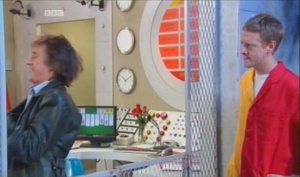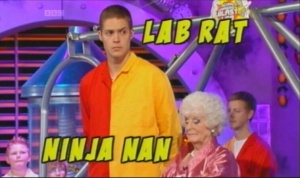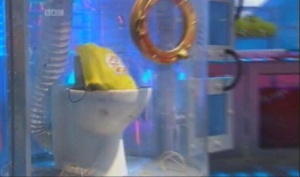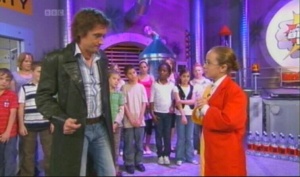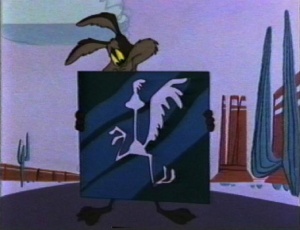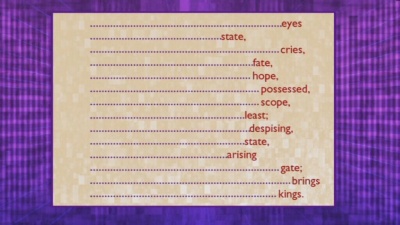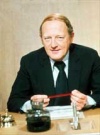Weaver's Week 2009-01-25
UKGameshows (Talk | contribs) |
m (1 revision) |
Revision as of 12:51, 22 December 2009
Last week | Weaver's Week Index | Next week
Some blokes hitting balls all over a blue screen might have taken this show off air, but our review is less easily dissuaded.
Richard Hammond's Blast Lab
September Films / Hamster's Wheel / Ingenious Broadcasting for BBC2, Saturday 8.30am
Goodness, that's a long list of production companies! Not that it makes the resulting programme anything less than coherent, entertaining, and (mostly) spectacular.
The basic plot is that Richard Hammond has been paid so much for hosting such flim-flam as Total Wipeout (which we'll be reviewing in two weeks) that he's been able to buy a huge house in the rural countryside. Seriously, it's a big house, large enough to hold not only his ego, but that of hangers-on like Jeremy Clarkson. That large.
And not that we see much of the house: all the action takes place in the basement. Mr. Hammond has converted his cellar into a laboratory, complete with high-tech security system, pool of toxic slime, and some laboratory helpers. These "lab rats" are entirely interchangeable and portrayed as entirely stupid. For reasons we've not quite understood, there's also a Ninja Nan, a character filmed entirely in slow-motion.
Each week, two teams come in to try and win some prizes. The teams must identify themselves via the security system, and one of them must perform a simple stunt to prove the team is who they say they are. Though each team has given themselves a sensible name, Mr. Hammond insists on calling the team dressed in red "The Reds", and the team dressed in yellow are always said to be "The Yellows". The logic behind his argument appears inescapable.
In the opening titles, Mr. Hammond was seen driving into his house in "Oliver", a car of some description. The car knows everything, including the answers to some true-or-false questions, which the host puts to the teams. We found the noises given when Oliver gave its responses quieter than on The Krypton Factor. There's also an estimation question, during which Mr. Hammond whips out a microphone hidden in a regular household object. This should be a comedy moment, but no-one ever laughs. It's a microphone hidden in a plant, people! That is intrinsically funny! Oh, please yourselves.
After this sedate start, we get to the first physical challenge of the week, involving one or more of the hazards that Mr. Hammond and his lab rats have casually left lying around. For instance, one challenge was to get a balloon to fly along a piece of string to the other side of the gunk tank. The winning team gets a point.
But there's a catch. While the teams are preparing for this game, Mr. Hammond takes the opportunity to deliver a brief and entertaining lecture about the week's scientific point. The balloon game was part of an episode discussing Newton's Third Law of Motion: the action of squirting air out of a balloon results in an equal and opposite reaction, moving that balloon in the exact opposite direction.
The principle will be demonstrated again by a stunt: in another episode, whether a home-built hovercraft would float effortlessly across a stream, or would sink and turn the lab rat into a wet lab rat. There's a quick nod to betting shows, as Mr. Hammond asks the teams if the stunt will or won't work.
Any advantage accrued in the early rounds is worth a few seconds in the messy Messy Messy Mess Test test, the final game to determine the overall winners. A fun little touch means that the teams get "some time" from the Some Time clock, without ever knowing (or caring) how much. Again, there's a little science before the round begins, with Mr. Hammond interviewing the week's stuntman, or explaining where the stunt went wrong.
The best is yet to come; the winning team gets to keep their prizes (a mixture of science-themed stuff and general consumer goodies), but the losers load the prizes they would have won into the Blow-Up Bidet, where they proceed to cause a big bang. So that is what a bidet is for! We always wondered...
All this might sound a bit dull, but it's a fantastic half-hour. Hammond's narration hits just the right note to be engaging without patronising, and there are plenty of running jokes (we've not even mentioned Mini Miss), sight gags, and comic-book style word captions. It's a thoroughly entertaining programme, and just happens to educate as it goes on. That's modern public service broadcasting at its best.
Countdown
Yorkshire Television for Channel 4, 3.25 weekdays
Eighth-final 6: Jonathan Coles (9 wins, 1 loss, 903) beat Anita Freeland (9 wins, 2 losses, 1002 pts), 95-88
Anita Freeland was the carry-over champion from Des Lynam to Des O'Connor, winning seven games under DC&DL. She returned for the summer 2007 finals, and won two pulsating games to reach the final, where she was narrowly beaten by Nick Wainwright. Jonathan Coles was on screen almost as much as Big Brother last June, winning eight games, then returning almost at once as the number four seed. He fell to David O'Donnell in the semi-final, having secured two centuries in his earlier games. Before the game begins, Jeff gives two very bad puns. Where would we be without very bad puns? Answers on a stamped address antelope...
Anita takes the lead in the second round, when Jonathan uses the same letter twice, and that's just not on. It's sevens all round in the opening period, not a single eight to be had, and a reasonably simple numbers game, means Anita leads 38-31 as Alistair Stewart says something or other. It sounds so much better at x16. Jonathan brings the game level in the seventh round with TOWNIES, and replaces the leader in the next round with REPLACE. Both contestants get the second numbers game (which is more than we did), so Jonathan leads 66-59 at the interlude. There's no change in the remaining letters games, or on the final numbers round, so it all goes down to the conundrum. Which no-one gets. Jonathan's won a flat game, a six in all rounds except one, nothing longer than a seven all game, some simple numbers games. He meets Jon Corby on Monday next week.
Eighth-final 7: Peter Davies (6 wins, 2 losses, 795) lost to Charlie Reams (10 wins, 1 loss, 1085), 66-85
Jeff already has stars in his eyes, wanting to go on an arena tour. We recall the time they took Question Time to Wembley Stadium. That was an error. Should the CoC be played before ten thousand fans, cheering whenever Susie puts away a nine? And why not. Charlie Reams was the third octochamp last autumn, winning eight games in October. Five centuries ensured he was the number one seed, and made the final. Peter Davies won six games in spring 2008, enough for him to return as the number 7 seed that summer. He surprised many people by beating Michael MacDonald-Cooper in the quarters, but lost to Richard Priest in the semis. Mr. Davies is one of two relatively late substitutes into this tournament, after other players were unable to join the recording.
A bowl of PETUNIA gives Charlie the lead in round one. Round two is AAA-rated, which can only mean it'll end in junk – there's nothing more than sixes. Round three is AA-rated, and has two eights, allowing Charlie's FLAMINGO to stretch the lead. Peter blobs on the first numbers, Charlie errs, we missed by one, so did Rachel, and Charlie's lead is 28-13. Both contestants score in the next two rounds, but DESOLATE is a winner for Charlie in the eighth, and his lead is looking impregnable. Peter risks SILOES* to stay in the game, but the plural lacks the E, and 29 points is the advantage, 64-35 at the intermission. The highlight of the final period is the host talking about his SIDEBURN, Charlie's ENACTOR seals a comprehensive win, though Peter scores on the last numbers and gets the conundrum. Charlie sets up a repeat of his recent final against Juanid Mubeen on Friday.
Eighth-final 8: Steven Briers (8 wins, 1 loss, 915) beat Debbi Flack (6 wins, 2 losses, 673), 121-74
Steven Briers appeared in November 2006, winning eight games with five centuries, and top-seed for the autumn's finals. There, he surprisingly lost to Phil Watson in the opening game. Debbi Flack won six games in September 2008, and though she only got one century, she charmed viewers with her warm personality. She is the second late substitute into this tournament.
The game begins with the letters STD, which everyone seems to find tremendously funny. Must be an audience of telephone engineers. Steven begins with ANTIPODES, the first niner of the season. And, blast, the set doesn't flash. Debbi tries to pull back with REFILMED* in the next round, but it's not present, and Steven goes further ahead. TINTER in the third puts him even further ahead, and it's 47-17 to Steven at the anecdote. There's no further difference until round nine, when Steven offers ESTATES; it's 82-45 at the intermission. Steven generally picks five vowels, and though Debbi has built up her score to a very respectable level, that explosive opening from her opponent killed the show as a spectacle. Steven will appear again tomorrow.
Quarter-final 1: Steven Briers (9 wins, 1 loss, 1036) beat David O'Donnell (12 wins, 1273 pts), 118-110
Both players begin with the same words, IDOLATOR, WINNERS, and DARIOLES. The two players do at least come up with different words in round four, and with both players getting the numbers game spot on by ingenious methods, the score at the anecdote is Deuce. The second part begins with David risking SAMANGO, an African monkey; and Steven putting up SAGUARO, the cactus-like plant seen around the set of the Roadrunner documentaries.
The deadlock is blown open in round eight; DESPITE David finding the second-longest word, Steven brings PESTICIDE to the table. After the studio's been evacuated and cleared, he's eighteen points to the good. Both players beat us (again) on the numbers game, and Steven leads 87-69 at the intermission. It quickly becomes clear that both players are on top of their game – Steven secures another century in round twelve, and that niner is the only time the players were split on the letters. A tremendously simple numbers game secures his victory, and both players check each others' work while the clock is running. David bows out of the game by solving the conundrum in almost precisely no time at all, but it's that niner that cost him the game. He'll play Kai Laddiman or Nick Wainwright in Wednesday's semi.
Quarter-final 2: Junaid Mubeen (12 wins, 1178) lost to Charlie Reams (10 wins, 1 loss, 1170), 79-88
The show begins with Jeff and Rachel demonstrating how the letters board is now on the back of the numbers bit. As they say somewhere else, let's rotate the board! This game repeats the last grand final from all of six weeks ago. The players are matched in the opening round, but Charlie takes an early lead with CRAZIES. Both players offer MESSEYS* in the next round, but it's not there – MESSES is fine, and it sounds as though Susie would have allowed MESSYS, but not the word offered. A tricky numbers game is no trouble to our players, and Charlie leads 32-25 at the anecdote.
It's honours even afterwards, until Junaid offers NOUGHTES*, a reference to the current decade. Susie's having none of it, we reckon there's an I missing. Junaid pulls back with ten points in the numbers game, Charlie's lead is 59-56 at the intermission. Who offered FLAVONOID in an earlier round? Can't have been either of these; they get six in round eleven, and even miss the sub-anagram VINDALOO. Charlie goes further ahead with BUNGEE in the penultimate letters game, and his risk of CANDIED in the next round pays off. A trivial numbers game puts Charlie nine up with the conundrum to go. Junaid offers a Hail Arizona answer with 29.2 seconds, Charlie has a comedy buzz on 29.9 seconds, and has emerged the winner. He'll meet Jon Corby or Jonathan Coles next Thursday.
Coming up next week:
Quarter-final 3: Jon Corby (10 wins 1 loss, 1104) v Jonathan Coles (10 wins, 1 loss, 998)
Quarter-final 4: Kai Laddiman (10 wins, 1 loss, 1001) v Nick Wainwright (12 wins, 1138)
University Challenge
Quarter-final, match 2: Lincoln Oxford v Queens' Cambridge
Lincoln have dispatched St Johns Cambridge and St Andrews, but will they do anything against a side not named after saints? After their early defeat, St John's went into the repechage, and came out with two scores of 300 points. Queens did for St George's London and Warwick, winning with 205 points in both matches.
We begin, as is traditional, with Word of the Week, "programme". Apparently, if the Word of the Week is offered on Countdown, a duck will descend from the ceiling holding the Secret of Eternal Life in its bill. It's not happened yet. Lincoln starts with a run of seven correct answers, with Andrew Mendelblat giving the first three starters. He goes for a fourth, but it's an incorrect interruption; Queens' picked up a missignal in the first question. We did not know that The X Factor takes its name from a payment given to soldiers for the inconvenience of being away from home; we thought it was from what people threw at the host. The visual round is on sonnet authors from their works cut down to the last word of each line. It's the first starter for Queens', and Lincoln is running away with it already, leading 85-10.
Lincoln gets the next two starters, and some bonuses, and they've opened up a lead of somewhat more than 100 points. It's still eighteen minutes until (er) whatever's on BBC4 next, but the game looks over. This could be a long show. "Your bonuses are on computer terms in Samuel Johnson's dictionary". This could be a very long show. Though Lincoln is entirely defeated by a set of bonuses on the date of Easter, the side opens up a 150-point lead before the audio round. That audio round is on a rock supergroup, "a bunch of old codgers known to your grandparents as The Travelling Wilburys", we're told, and Lincoln's lead is 175-10.
Belatedly picking up the bonuses, Queens' don't recall George Harrison's vocals, but they have heard of Bob Dylan. Bad luck. Normal service is resumed as Lincoln get the Shortz Beater of the Week, Reversed Consonants such as "ride" and "dire". And if you'd like to play Will Shortz's puzzle one week, send your postcards to NPR in Washington, to arrive no later than 1 February 1956. Lincoln extends their lead to 195 points before Queens' begins a bit of a comeback. It's only a bit of a comeback; by the visual round (works from Renaissance Faces), every member of the Lincoln side has answered a starter correctly, and leads 250-35.
Queens' have two mathematicians on their side, and do well to remember the definition of "kurtosis" and then get a set of bonuses about Roger Penrose and his tiles. It's like using a fly-swatter to deal with wave after wave of jumbo jets; Lincoln are completely overpowering their opponents, and they didn't need to answer a single bonus question correctly all night to win. The final score is 335-50, the largest winning margin for 11 years.
This season, we've had a 325 (St Johns Cambridge), 330 (Corpus Christi Oxford), and a 345 (St Johns Cambridge again). Andrew Mendelblat led with nine starters for Lincoln Oxford, the side made one missignal and 32/51 bonus questions, having been at 27/39 with about four minutes to play. Jonny Nye had a captain's innings for Queens' Cambridge, two starters as the side was correct in 4/12 bonuses, but wrong in two starters. The poem in the picture was written by Shakespeare.
Next match: Corpus Christi Oxford v Exeter
This Week And Next
We've raved in the recent past about Escape from Scorpion Island, but found last week's finale to be the worst episode of the season. Something was just wrong with the show. Perhaps it was that almost the entire programme revolved around youngsters scrambling up a muddy hill. Perhaps it was the way hoses were always being trained on one team and not the other. The hosts' narration has always been the weakest part of the programme; their one trick is asking us to imagine something horrible that we've just seen on screen: "Imagine listening to Jay Kay and/or Joel for days on end." Anyway, we're not going to let one bad episode spoil thirteen good ones before.
No such trouble for Brain of Britain, where the 2008 series came to a belated end this week. Geoff Thomas took the game by the scruff of the neck, and beat all his opponents by a full round. Mr. Thomas becomes the fifth person to win both Brain and Mastermind, and reigning Mastermind champion David Clark discusses the other double winners on his blog.
The big news from North America this week is the new man in the country's hot seat. He carries the hopes of a once-proud nation, recently left tattered and reeling from the constitutionally-dubious machinations of narrow partisans. Yes, CBC announcer and quondam Jeopardy! host Alex Trebeck is to return to the CBC, to host Canada's Next Prime Minister. It's their version of Election, only involving grown-ups, and less good, and seeking to find someone to follow in the footsteps of Stephen Harper and Michael Ignatieff. We reckon they should be watching Newsnight Review, someone's got to...
Viewing figures for the week to 11 January are in, and the 8.8m who saw the return of Dancing on Ice made it the most popular game show. In It to Win It had 6.9m, and Your Country Needs You 5.15m. Those were both gains, but Total Wipeout lost viewers, ending on 4.85m. BBC2's Masterchef (3.85m) beat Friday's Celebrity Big Brother (3.75m), with University Challenge (3.3m) and The Real Sir Alan (3.25m) in close proximity.
Come Dine With Me led on the digital tier, 875,000 saw the vintage show on More4. Gladiators had 620,000, and QI on Dave had 540,000; Mock the Week also had more than half-a-million. On CBBC, Blast Lab and Trapped both had 235,000 fans, while old Millionaire on Challenge secured 110,000 viewers.
Broadcast magazine announced the results of its readers' poll. The Entertainment category was won by The Apprentice, with The X Factor finishing close behind. The slightly esoteric International Programme Sales gong went to Come Dine with Me, and it was also a runner-up in Daytime. Most Horrible Thing went to Spiders for the fifteenth year, and Unsigned Act did well in Music.
We entirely agree with Mr. Bother that this week's Intelligence test on The Krypton Factor would have worked better with little plastic dials. Trying to rotate images by touch is just strange to the viewer, and we suspect that it's unnecessarily frustrating to the contestants. It's entirely possible that the show's budget didn't run to tactile tests, every last penny having gone on the ear-splitting klaxons in the Mental Agility round.
In the coming week, The Book Quiz (BBC4, 8.30 Monday) returns, and Mastermind (BBC2, 7.30 Friday) picks up with heat 15. Changes to the TV5 schedule mean Questions Pour un Champion moves to 4.30pm, and Fort Boyard to 1pm on Wednesdays. Replacing Brain of Britain is the antidote to intelligent games, Quote... Unquote (Radio 4, 1.30 Monday); wouldn't One-Handed Tie Tying be more entertaining? Highlight of the week is at 8am next Sunday morning, when Challenge starts showing Interceptor again.
To have Weaver's Week emailed to you on publication day, receive our exclusive TV roundup of the game shows in the week ahead, and chat to other ukgameshows.com readers sign up to our Yahoo! Group.

